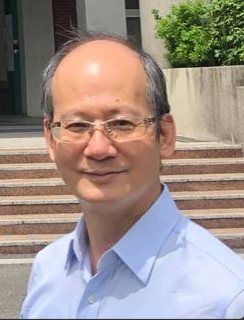
Prof. Chih-Huang Weng
Chairman of Department of Civil Engineering, I-Shou University, TaiwanSpeech Title: Persulfate Oxidation Process Activated by Iron-rich Minerals for Textile Wastewater Treatment
Abstract: Effluent from the textile industry is generally associated with toxic and nonbiodegradable synthetic azo dyes. Conventional biological activated sludge treatment process followed by perchlorate oxidation may not be a proper process to treat such effluent because of its low treatment efficiency and concerns about chlorination in the water environments. Advanced oxidation processes using HO• and SO4•– radicals are an effective way to degrade the complex structures of synthetic azo dyes. Researchers have gained more interest in studying the activated persulfate (PS) decontamination process mainly because the process can generate high reactive SO4•– radicals and work on a wide pH range. Nevertheless, selecting a suitable oxidation process remains challenging because an activation process's degradation efficacy and operating cost depend not only on the operating parameters but also on the activation material itself. Consequently, searching for an activation process for the effective degradation of complex dye structures with ease of operation while keeping the cost down is essential. Due to its non-toxic nature and low cost, iron is the most favorable activator among the transition metals. However, the selection of a suitable Fe activator is crucial. This presentation outlines the performance of using Fe-based materials, such as Fe2+ ion, nano-Fe0, Fe0 aggregates, magnetite, and magnetic Fe-nanocomposites. The prospect of natural iron-rich minerals (Schorl, biotite, Mackinawite, and pyrite) as highly efficient catalysts in activating persulfate to treat textile wastewater will be addressed in depth. In particular, using ultrasound and heat to examine the robustness of the Fe-mineral-activated PS process further underscores its potential for optimism about the future of wastewater treatment.
Biography: Distinguished Professor Chih-Huang Weng is the Chairman of the Department of Civil Engineering at I-Shou University, Taiwan. He also served as Vice-President of North Kaohsiung Community University, Taiwan. Prof. Weng received his MS and Ph.D. degrees in 1990 and 1994, respectively, from the Department of Civil Engineering of The University of Delaware, USA. He is serving as the Editor of Water (MDPI) and Editor of Environmental Geochemistry and Health (Springer), and on the Editorial Board Panel Member of Coloration Technology (Wiley). He has also served as a Guest Editor of SCI journals, such as Agricultural Water Management (Elsevier) and Environmental ScPrience and Pollution Research (Springer). He has also organized and chaired several international conferences. Professor Weng was listed in the World’s Top 2% of Scientists (Stanford University, 2021 and 2022). His main research interests focus on using advanced oxidation processes and adsorption to treat wastewater and bacteria inactivation, groundwater modeling, and application of electrokinetic technologies to soil remediation/sludge treatment/activated carbon regeneration.
